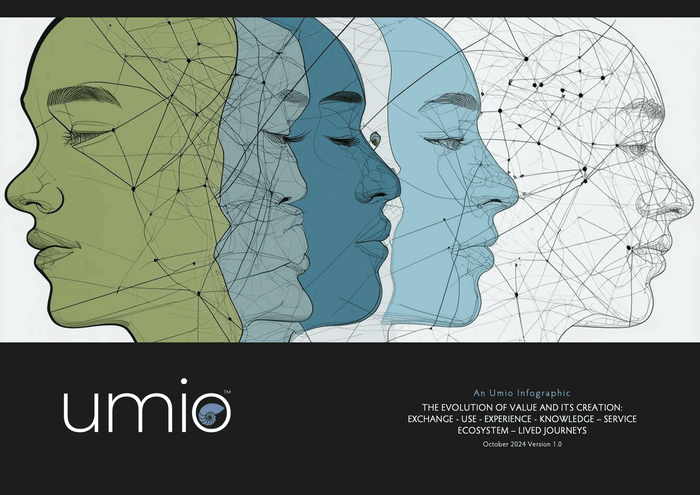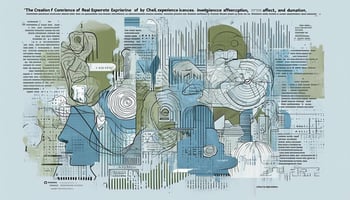In this piece, I summarise the logic of interactional creation via (real) experience ecosystems in...
Exploring the Interactional Creation of Value in Lived Experience Journeys
The Umio infographic outlines the evolution of value creation, highlighting six forms of value generation through different perspectives and mechanisms.
It traces a journey from transactional value creation (value-in-exchange) to more dynamic, ecosystem-centric models of value co-creation that are deeply rooted in lived experiences. The sixth form of value creation, "distributed stakeholder co-creation in lived experience journeys via platforms," represents the pinnacle of this evolution.

INFOGRAPHIC: The Evolution of Value and its Creation
This infographic shows the evolution of the nature and content of customer and enterprise value and its creation through six inclusive forms: Product, Value-in-Use, Personal Experience, Knowledge Co-creation, Service Ecosystem and Lived Journeys. A0 size hi-res for printing.
Summary of Distributed Stakeholder Co-Creation in Lived Journeys
- Core Concept: Value is created not just through individual or dyadic exchanges but through complex, distributed interactions among diverse stakeholders. These stakeholders include human and non-human actors (e.g., technologies, ecological factors) within interconnected platforms and ecosystems.
- Mechanism: It relies on assembling and leveraging affective capacities, knowledge flows, and actor resources. These interactions lead to the emergence of lived experiences that are personalized, impactful, and contextual.
- Focus: The emphasis is on designing platforms that facilitate multi-stakeholder collaboration, ensuring experiences are co-created equitably and sustainably while addressing real-world challenges.
- Outcomes: Stakeholders collectively achieve transformative impacts, shifting focus from product/service delivery to sustaining ecosystems capable of generating desired lived experiences.
Next-Generation Case Studies
Here are lesser-known examples of initiatives embodying this sixth form of value creation:
1. Open Artificial Pancreas System (openaps.org)
- Description: A distributed, community-driven initiative where diabetes patients, developers, and researchers collaborate on creating open-source algorithms for insulin regulation. Platforms like GitHub are used to co-create and refine the system.
- What’s Unique: Patients are not passive users but active co-creators, contributing lived experiences and technical insights. This model demonstrates a shift from centralized healthcare solutions to a stakeholder-driven ecosystem.
- Impact: It enables hyper-personalized diabetes management, fostering empowerment and real-time innovation through shared knowledge.
2. Neighborly Collaboration Platforms for Post-Disaster Relief: e.g., Recovers (recovers.org)
- Description: Platforms like "Recovers.org" enable communities affected by natural disasters to co-create relief and rebuilding strategies. These platforms bring together residents, volunteers, nonprofits, and local governments.
- What’s Unique: The co-creation occurs in situ, leveraging lived experiences of disaster victims and integrating them with institutional and resource capabilities.
- Impact: Real-time, hyper-localized solutions are generated, improving recovery outcomes while democratizing access to critical resources.
3. Living Beyond Chronic Pain: e.g., Ooex (ooex.co)
- Description: Online platforms that unite patients, therapists, and researchers to co-create new tranformative pathways for chronic pain conditions using lived experience data and scientific research.
- What’s Unique: It moves beyond traditional patient-provider relationships, allowing users to integrate pain and treatment insights with their daily experiences, fostering collective knowledge creation.
- Impact: Participants report transformative life changes, reduced reliance on pharmacological treatments, and increased self-efficacy.
4. Indigenous Knowledge Co-Creation via Digital Platforms: e.g., Mukurtu (mukurtu.org)
- Description: Projects like "Mukurtu" empower indigenous communities to share and protect their cultural heritage through co-designed digital platforms.
- What’s Unique: These platforms prioritize cultural sovereignty, allowing communities to control how their lived experiences and knowledge are curated, shared, and utilized.
- Impact: It fosters cross-cultural understanding, equitable resource-sharing, and long-term preservation of cultural identity.
These examples demonstrate the transformative potential of distributed stakeholder co-creation. The shift to platforms as enablers of lived experience journeys aligns with emerging societal and ecological needs, creating profound and sustainable value for all actors involved.




Leave your comment